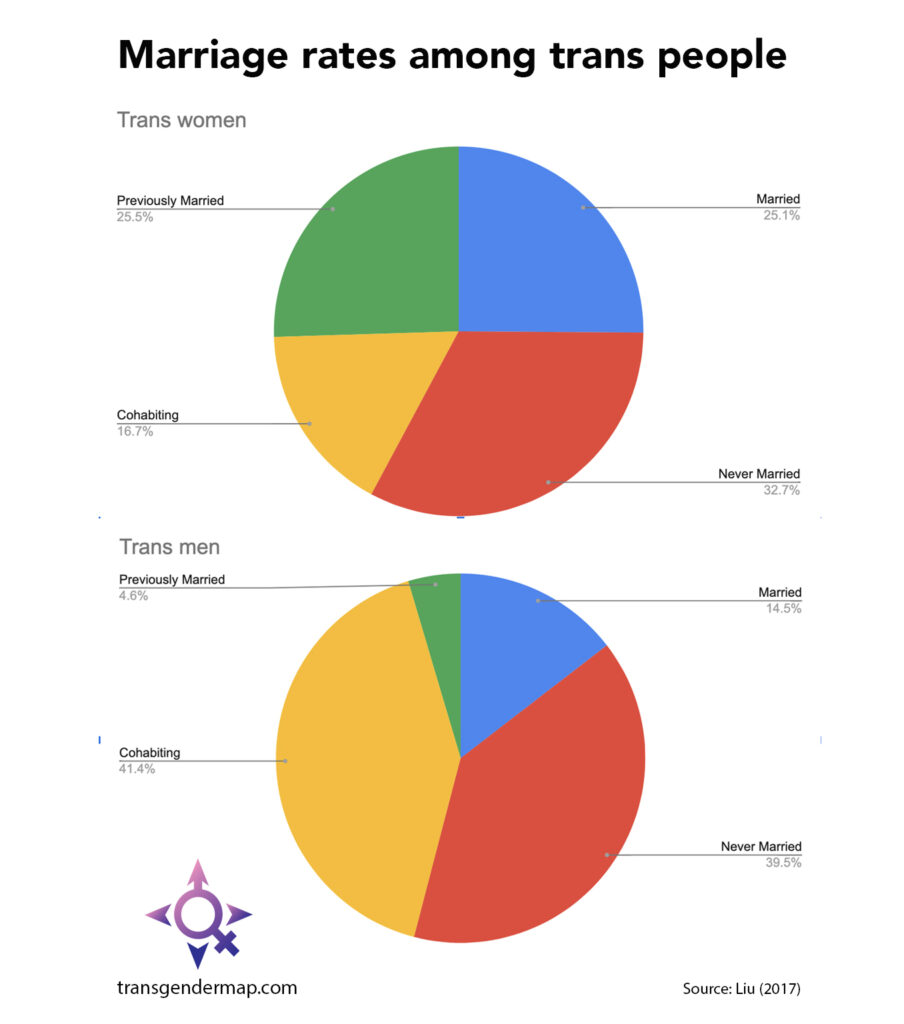Transgender people can get legally married before or after transition in many places. Some get married before and remain married through their transition. Others get divorced before or after transition, and sometimes during their transition.
My page on same-gender loving people has examples of couples who stayed married after a gender transition by one spouse.

Source: Liu 2017
Marriage
Many people in our community hope to get married or are married, but the legal status of those marriages depends on several factors:
- Status of your documentation
- Country you live in
- State or province you live in
- Sex of spouse
- Trans status of spouse
Laws vary by country, so you could have a legally binding marriage in one country that would not be recognized in another.
United States
The 2015 Supreme Court case Obergefell v. Hodges ruled that the fundamental right to marry is guaranteed to same-sex couples. This has the effect of making all trans marriages legal, since the sex of either spouse was now moot. However, there are some places within the United States that still have laws on the books prohibiting marriage, and the language in some could be interpreted to mean some trans marriages are not legally recognized. That means that it’s important to determine your legal status
- In your birth state
- In your state of residence
- In the state where you get married
Because of the number of variables, it is difficult to say with certainty what your status might be. If you are not sure, you need to check with a legal professional who can ensure that everything is handled properly.
Critical steps for a legally binding marriage after transition:
- Court Order For Name Change
- Social Security name and gender change
- Birth certificate name and gender change (not possible in all jurisdictions
Divorce
In the past, many marriages ended in divorce when one of the spouses came out as transgender. While this does not happen as often, it is important to plan for this worst case scenario when coming out. Many spouses see withholding trans feelings from them as a lie of omission.
While many divorces are typical, some become very difficult and expensive, especially if there are children involved.
Consider counseling
Lawyer Susan J. Mundahl summarizes the issues and recommends counseling even if you do plan to divorce:
There will be a range of emotions on the part of both spouses. The trans spouse may feel fear about the future, relief at having finally been honest, affection for their spouse, and guilt for hurting them with the news. The other spouse may feel shock, anger, embarrassment (what will people say?), and grief at the loss of the relationship they believed they had.
Even if both partners believe the marriage cannot or should not be saved, counseling—either alone or together—can help them process emotionally what is going on, and divorce in a way that is less damaging to both of them and especially to any children in the home.
Mundahl (2019)
Consider mediation
A mediator can help make the divorce as friendly and cost efficient as possible. It can also be helpful when emotions are high, such as when children are involved.
Being trans can affect the outcome
Some spouses hoping to prevail in custody, alimony, and other matters may claim their trans spouse is an unfit parent or even a danger to the children. Others may present being trans as a form of infidelity. People who live in conservative places or happen to get conservative judges may face significant challenges as well.
See also
Divorced spouse’s essay and responses
References
Mundahl, Susan J. (May 20, 2019). Divorce Issues for Transgender People. Mundahl Law, PLLC
Wood, Natalie (June 20, 2018). What Happens After the Person You Married Tells You They’re Transgender. The Stranger
Mayer, Lisa Helfend (July 26, 2017). “Honey, I’m Transgender” – Navigating Marriage and Divorce When Your Spouse Reveals Their Truth. HuffPost
Minter, Shannon Price (2018) Legal Issues in Divorce for Transgender Individuals. In LGBTQ Divorce and Relationship Dissolution: Psychological and Legal Perspectives and Implications for Practice. https://doi.org/10.1093/med-psych/9780190635176.003.0017
Resources
HRC (hrc.org)
Lambda Legal (lambdalegal.org)
National Center for Transgender Equality (transequality.org)
- Marriage Equality and Transgender People (PDF)
Law Offices of Kristine W. Holt (holtesq.com)
Disclaimer: This is legal talk, not legal advice. Laws vary by jurisdiction, and some of the information discussed on this page may not be applicable in your case. It is up to you to confirm any information herein by doing your own research.